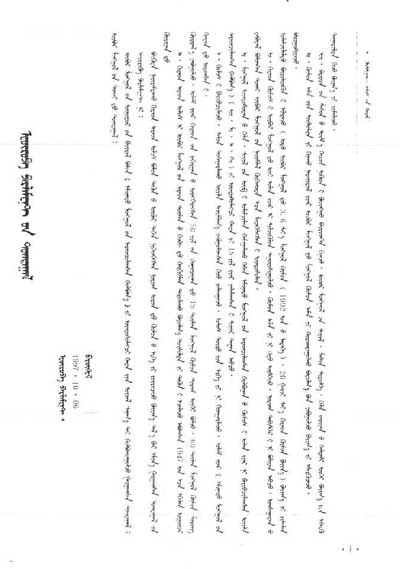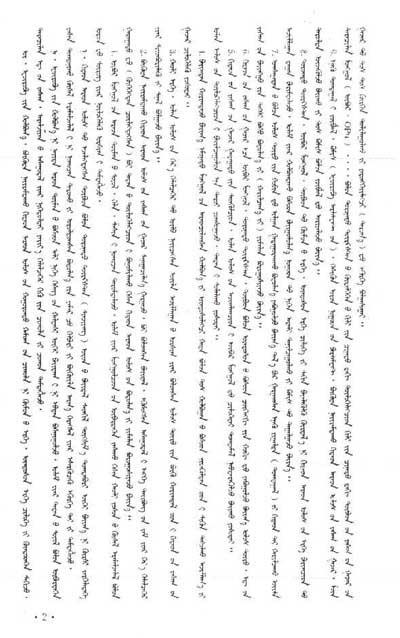 |
 |
 |
| |
 <Back> <Back>
An European Parliament Resolution on
Inner Mongolia
The European Parliament adopted
the following resolution on Inner Mongolia, thanks to the great
effort of the European Radical Alliance. Also the European People
Group, the Liberal group, the Green group and the Union for
Europe Group supported the resolution. |
| |
PE/Inner Mongolia: Resolution |
| |
Resolution concerning
the present situation in Inner Mongolia and the conviction of
the founder of the "Southern Mongolian Democracy Alliance,"
Sig. Hada. |
| |
The European Parliament,
- in light of its preceding resolutions on the violation
of human rights in the People's Republic of China and its
annexed territories;
- in consideration of the fact that the People's
Republic of China has, beginning with its occupation in
1947 and through today, through the continued exercise of
a politics of repression towards the population of Inner
Mongolia, caused the disappearance of over 150,000 Mongols
and the imprisonment of another 800,000 Mongols during the
50 years of Chinese administration;
- in consideration of the arrest, on the accusation of
fomenting separatist activity, deprivation of political
rights for four years, and conviction to 15 years imprisonment
of Sig. Hada, who is the founder of the "Southern Mongolian
Democracy Alliance" (SMDA);
- in consideration of recent events that have transpired
in Hohhot, the capital of Inner Mongolia, that have led
to the arrest of numerous SMDA activists who are involved
in the tutelage of the Mongol cultural and linguistic heritage;
- in denouncement of the constant return to the strategy
of transferring Chinese nationals to repopulate Inner Mongolia,
a policy which began with the annexation of the territory,
and that is directed at destroying the ethnic composition
of the territory, with over 20 million Chinese citizens,
thereby reducing the native population to a small minority
(3.6 million Mongols remain according to a 1992 estimate);
- in denouncement of the use of sterilization and abortion
by the Chinese authorities as practices for controlling
demographics;
- in observation of the constant register of Buddhist monasteries
and attacks upon the cultural, religious, and linguistic
integrity of Inner Mongolia;
- in consideration of the necessity of a continuous open
dialogue between the European Union and the People's Republic
of China, most importantly with emphasis on the extreme
importance for the respect of human rights and fundamental
liberties, let alone economic and commercial relations;
- in consideration of the European Union's duty to intervene
with all the means at its disposition in order to oppose
any type of politics that attempts to destroy the integrity
of entire populations or parts thereof, or which aims to
suppress their culture or aspirations of autonomy;
- with vivid alarm concerning the growing instability in
Tibet and Eastern Turkistan (Xianjing), regions that are
occupied by the People's Republic of China, and the consequences
that these could provoke in the bordering regions;
|
| |
|
| |
- condemns the politics of the People's Republic of China
regarding its inclination to suppress the culture,language,
and religion of the population of Inner Mongolia and the
suffocation of every legitimate aspiration towards autonomy
of the Mongol people and its representatives in exile;
- asks that the government of the People's Republic of
China initiate a political dialogue with the Mongol opposition
so that a peaceful solution to the question be negotiated;
- asks that the Chinese government release all its political
prisoners whose acts are not provided for by laws or by
international treaties;
- asks the Chinese government to immediately reopen the
trial of Sig. Hada, the founder of the SMDA, and other activists
of the SMDA who have been arrested, in the presence of international
observers;
- asks the Chinese government to allow journalists and
international observers regular access to Inner Mongolia;
- condemns the recurrent inequality in the political and
economic treatment actuated by the Chinese government when
dealing with the occupied populations of Inner Mongolia,
Eastern Turkistan, Tibet, and other ethnic minorities;
- asks the Commission to introduce a clause against ethnic
and political discrimination in its cooperation accord with
China, as well as the creation of adequate bodies to monitor
compliance with the clause;
- invites the Commission and the Council to exercise pressure
on the authorities of the People's Republic of China until
the respect for human rights and fundamental rights be guaranteed,
whether it be in Eastern Turkistan, Inner Mongolia, or Tibet;
- charges its President with the transmission of the present
resolution to the Council, the Commission, the Parliaments
of the Member States, the government of the People's Republic
of China, the representatives of the Mongol movement in
exile, the representatives of the Movement of the people
of Eastern Turkistan in exile, and the Tibetan government
in exile.
97-09-18
|
| |
 |
| |

 <Back> <Back>
|
|
 |
| |
|
 |
|





